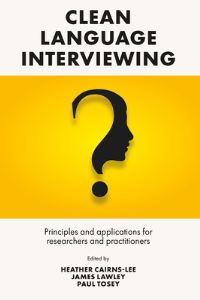Presented at The Developing Group, 4 Dec 2010
For the last few years we have been dabbling with improvisation as an art form. First through clowning and more recently with the grandaddy of modern Improv, Keith Johnstone. Keith’s involvement with theatre began in the 1950s and then in the 1970s he wrote Impro: Improvisation and the Theatre (reprinted 2007).
Our dictionary defines ‘improvise’ as to act spontaneously without premeditation or to make something from whatever is available. Interestingly, the Latin root of improvise comes from ‘make preparation for the unforeseen’ – the distinction between preparation and premeditation seems to us paramount.
The two definitions of improvise would seem to apply to how a clean facilitator works. And there’s another parallel: improvisational comedy works with highly structured ‘forms’ within which improvisors are free to be creative. Sounds like a Clean Language session to us.
During our training with Keith we kept thinking ‘yes, that’s also what a Symbolic Modeller needs to do.’ We saw untold links between Improv and our previous exploration of Maximising Serendipity. And we saw how training in improvisational techniques can cross over to improve clean facilitation.
We think the benefits are enhanced:
Responsiveness to what’s happening (verbally, nonverbally and within the client’s inner landscape)
Flexibility to extend the boundaries of our accustomed responses
Openness to emergence: Creating conditions for something new to happen
Receptive to serendipity: Following intuitions of productive pathways (vectoring)
Acting without ego: Putting our stuff aside and going with the process
Amenability to change: Being willing to be changed by what happens (i.e. continually updating our model and being open to the possibility that we might have mis-modelled, made a mistake or misunderstood).
We attended one of Keith’s workshops in London, Aug 31–Sept 3, 2010 where he offered an abundance of pithy sayings and creative activities. Below we have reproduced some of these sayings. The words (in italics) are Keith’s, the organisation of those words is ours.
Some of Keith’s advice may seem contradictory or paradoxical. This is common with experts who operate from multiple perspectives and at multiple levels. But they are contradictory only if you maintain a single level and and a single perspective.
The sayings of Keith Johnstone
I’ve spent my life inventing ways to avoid Freud’s censor.
Keith on learning
Learn by making mistakes.
Keith started to learn to ride a unicycle but gave up after 20 minutes. Then he was told that you have to fall off for 6 hours before you learn how to stay on.
Be happy when you fail.
Most people won’t make more than 200 mistakes without getting depressed.
You don’t learn much without risk. (But the place has to be safe.)
You shouldn’t do Improv if you can do it.
Improvisors whose suggestions are accepted know what to do, but the person whose suggestion is rejected has an opportunity to learn.
You don’t have to try to improve, you just have to notice what you do and what happens.
Keith drew 5,000 faces because he heard you have to make 5,000 mistakes before you become good at anything. This released him from having to be good at drawing because he knew he had plenty more faces left to draw. He numbered each face so he could track his progress. Maybe once every 60 he noticed some improvement.
Keith on good ideas
You already know what to do.
Don’t do your best, just be average. Voltaire said “The best is the enemy of the good.”
You don’t have to be original – it’s the art of the obvious.
Bob Newhart was a good example of setting up a strange situation and then acting completely normal within that situation.
You don’t need good ideas.
You can’t be better than you are.
You shouldn’t care if you have an idea or not.
It’s more productive to hunt the obvious than to pursue the original.
You don’t need to be good at what you are improvising, just act as if you are.
Have ideas, but don’t use them. Take a moment to look at the other improvisor. Wait until an idea strikes – you do not have to be original. You can copy someone else or an old idea.
Keith on Change
Your job is to be changed so they can see it.
You are fighting human nature. The audience wants things to happen (you to change). The improvisor doesn’t.
Improvisors don’t want to listen because they don’t want to be changed. By speaking they avoid listening. But the audience want to see you change.
Keith on fear
People use too much effort. It’s fear that makes you do too much.
People are frightened of what their mind might think.
You have a choice: You can hide the fear or get rid of it. One way is to lower your standards.
Keith on the intellect
Get your mind out of the way so something else can operate.
The intellect can justify anything. It can override anything. And that makes it frightening.
The addition of (vocal) sounds helps to switch off the intellect and engage the emotional parts of the brain.
The intellect divorces you from the physical world. Focussing on objects switches off the intellect.
Keith on working with other improvisors
Make other people look good.
Oscar Wilde headed for the dullest person at a party and made them sparkle.
You’re not competing with anyone, not even yourself.
Give your partner what they want.
A good suggestion turns your partner on.
Match status level to keep the dominant / submission relationship equal.
Status not about the role it’s about the relationship between the improvisors. In the film Arthur, Sir John Gielgud is a high-status servant.
If you are in the past or in the future you won’t see the other actors.
Get people into the right state to do what they want to do (even if they don’t know what that is until then).
Treat volunteers like royalty.
Keith on the audience
Give the audience what they want. Do what they want to see.
Don’t trust the laughter. Don’t think just because the audience laughs it’s good Improv.
Keith asked audiences to vote 1 to 5 on each Improv sketch. They found high scores were not correlated with the amount of laughter.
Rather than trying to get rid of the words, your job is to make the audience listen to what you say. Your voice has to reach out to the audience and control their listening.
If something is about to happen the audience loves to be made to wait.
If you promise the audience something – deliver.
Keith on stories and drama
A story starts with a large circle of probability. Each new piece reduces the circle.
All stories are mysteries. The audience is not passive, they are trying to find out why people are doing what they are doing and how the action fits together into a story.
A alters B – that’s drama.
Drama is about action that is yet to be completed. If the action gets completed it becomes a documentary.
The possibility of instability keeps people attention
To find out what kept his attention, Keith recorded what he watched on TV as he channel-hopped. He reviewed the tape for when he stayed watching something and when he switched channel. He doesn’t like golf, yet he had to find out whether the ball went into the hole or not. Thus he discovered the importance of instability.
When a scene is stable it only takes one person to change for the scene to become unstable – then something interesting can happen.
How do you make something more interesting without moving on? Slow down. It’s good to take your time.
Keith on the nature of Improv
One way to know good Improv is if it looks well-lit – and you remember it that way.
Master improvisers are master storytellers.
How an Improv starts is how it goes on.
You can’t decide how it is going to turn out and you can’t make sure every Improv works, so get on and do it and see what happens.
For the improvisor every night is a first night.
You have to get rid of the cliches first.
Just try to make it work – the gags will come in the mistakes.
It’s no good just knowing what you want. You have to do something to get it.
You don’t have to feel the feelings, you have to make the sounds and actions to invoke a response from others.








